Reagan Funeral Service
The speeches were all quite touching. It was a shame that Mrs. Thatcher wasn’t physically able to deliver her eulogy but the fact that she had the presence to record it so far in advance, despite her own ill health, says much about her genuine affection for her comrade-in-arms. Former President Bush was, as has been the case of late, quite sentimental and comfortable in his own skin. And President Bush’s speech was as well-delivered and well crafted as any I’ve seen him give. As I’ve noted before, he can be quite eloquent when he has a live audience and is talking about something about which he has genuine conviction.
WaPo — Thousands Gather for Service Honoring Reagan
After lying in state in the Capitol Rotunda for more than 36 hours, the remains of former president Ronald Reagan arrived at the National Cathedral for a funeral service attended by the Reagan family and several thousand dignitaries from across the nation and around the world. At the cathedral, eight military pallbearers preceded by flag bearers carried the flag-draped casket from a hearse to the front entrance as a military band played ruffles and flourishes. Nancy Reagan, wearing a black suit, walked slowly up the cathedral steps behind it, followed by Reagan’s three surviving children and their families.
President Bush, sitting in the front row, led the former first lady to her seat across the aisle as the service began about 11:30 a.m.
Earlier at the Capitol, Nancy Reagan entered the Rotunda shortly after 10 a.m. EDT and approached the casket lying on a wooden platform, called a catafalque, that dates from the funeral of Abraham Lincoln.
The 82-year-old widow ran her hands over the American flag covering the casket, whispered a few words as if speaking to her departed husband and gently kissed the flag. After a final farewell pat, she made her way out of the Rotunda on the arm of Maj. Gen. Galen B. Jackman, the commander of the U.S. Army Military District of Washington, who has escorted her throughout the six days of public ceremonies.
Nancy Reagan and members of the Reagan family then waited at the bottom of the Capitol’s western steps while Army howitzers fired a 21-gun salute and the casket was carried down to a waiting hearse to the strains of a military band. Standing under an umbrella, Nancy Reagan held her right hand over her heart as the casket was placed in the hearse.
After today’s funeral service in Washington, the body of Reagan, who died at his California home Saturday at age 93 after a 10-year battle with Alzheimer’s disease, is to be flown back to his home state for burial at his Simi Valley presidential library in a sunset ceremony.
Under cloudy skies and drizzling rain, crowds gathered in the streets of the capital to watch the hearse containing the mahogany casket make the five-mile trip to the cathedral from the Rotunda.
By the time public viewing ended at 8 a.m. EDT, an estimated 90,000 people had filed past the casket in the hushed Rotunda, the silence broken only by the shuffling of feet and the periodic changing of the joint honor guard composed of members of the armed services.
***
As part of a final day of ritual and tribute, American military bases around the world scheduled 21-gun salutes at noon, followed by a round of 50-gun salutes at dusk.
And in what organizers described as a new tradition, the cathedral will ring its bell 40 times following the funeral — symbolizing Reagan’s standing as the 40th president. Churches across the nation have been invited to join in that gesture by ringing their own bells 40 times at around 1:15 p.m. EDT.
NYT — Funeral Services Under Way for Reagan
It was a day Ronald Reagan had himself helped to plan: a funeral service that will fill the National Cathedral in Washington today with world leaders past and present, friends and a former enemy, and ringing tributes to the man who took his overwhelming optimism from Hollywood to the White House.
Final ceremonies for the 40th president, who died on Saturday at the age of 93, will conclude a week of formal public remembrances, and will be marked by a national day of mourning and the ringing of church bells for 40 times across the country.
***
Nothing will have been left to chance at the cathedral, where guests include Prime Minister Tony Blair of Britain, Prince Charles, Kofi Annan, Secretary General of the United Nations and former President Lech Walesa of Poland.
During his first year in office, at the age of 69 in 1981, Mr. Reagan asked Mr. Bush, his vice president, to speak at his funeral. And because he was proud of appointing the first woman to the Supreme Court, Mr. Reagan extended a similar invitation to Justice Sandra Day O’Connor.
But it was Mr. Reagan who chose what Justice O’Connor would read: John Winthrop’s 1630 sermon that inspired Mr. Reagan’s own description of America as a shining “city upon a hill.”
Others to deliver tributes will be the former Canadian prime minister, Brian Mulroney, a close friend who shared an Irish ancestry with Mr. Reagan, and President Bush, who has described Mr. Reagan as “a national treasure.”
A number of years ago, Mr. Reagan asked Margaret Thatcher, the former British prime minister who was known as “The Iron Lady,” to speak at his last rites. The two shared the same political philosophy and became fast friends.
Lady Thatcher, who has given up public speaking after a series of small strokes, taped her remarks months ago.
WaPo — A Widow’s Heartfelt Farewell
Hers is a private grief gone public.Nancy Reagan never wanted to be anyplace except by her husband’s side, friends say. In this week’s elaborate tribute for the nation’s 40th president, she has made her ceremonial walks clutching the arm of a stranger. But she stands alone. She has reconciled with her children, and they comfort her, but at most of the choreographed pauses in these rites, they are not in this circle of two that was Nancy and Ronnie.
Today, the 82-year-old former first lady faces her most exhausting day, a state funeral in a cathedral packed with the nation’s and world’s dignitaries, many of whom will want to bend and murmur their condolences, followed by a rapid departure back across the country, to a California burial before sunset.
Yesterday, sequestered with her family at Blair House, she was called on for a half-hour by President and Laura Bush and national security adviser Condoleezza Rice, as well as former Soviet president Mikhail Gorbachev and former Canadian prime minister Brian Mulroney.
“All of this ritual of mourning is good,” said her biographer, Bob Colacello, yesterday. “This is on such a grand scale that the public and private have completely merged. It’s a magnificent moment in history, and that has to please her.”
Yet this remains a long and personal goodbye, and, in her every stroke of her husband’s coffin, her friends say they see that Nancy Reagan is having trouble letting go.
“That was the relationship, that was the life, Nancy and Ronald Reagan,” for 52 years, said Sheila Tate, the former first lady’s press secretary. “This is her last ceremony. And, even though he was limited by Alzheimer’s for the last number of years, he was still there. So the shock is still there” when death comes.
Reactions from around the Blogosphere:
- Jen found the speeches, particularly Thatcher’s, moving. She is disturbed that some are saying hateful things on this day.
- Bill Hobbs has a nice photo roundup.
- Steven Taylor reflects on what Reagan meant to him.
- Matt Yglesias proposes putting the Gipper on the $50 bill.
- Joe Gandleman believes honoring presidents is important.
Transcripts of the eulogies as well as more photos and links appear in the extended entry.
Text of Former Canadian Prime Minister Brian Mulroney Eulogy of Former President Reagan
MULRONEY: In the spring of 1987, President Reagan and I were driven into a large hangar at the Ottawa airport to await the arrival of Mrs. Reagan and my wife Mila prior to departure ceremonies for their return to Washington.
MULRONEY: We were alone except for the security details.
President Reagan’s visit had been important, demanding and successful. Our discussions reflected the international agenda of the times: the nuclear threat posed by the Soviet Union and the missile deployment by NATO, pressures in the Warsaw Pact, challenges resulting from the Berlin Wall and the ongoing separation of Germany, and bilateral and hemispheric free trade.
President Reagan had spoken to Parliament, handled complex files with skill and good humor, strongly impressing his Canadian hosts. And here we were waiting for our wives.
When their car drove in a moment later, out stepped Nancy and Mila looking like a million bucks. And as they headed towards us, President Reagan beamed. He threw his arm around my shoulder. And he said with a grin, “You know, Brian, for two Irishmen, we sure married up.”
In that visit, in that moment, one saw the quintessential Ronald Reagan: the leader we respected, the neighbor we admired, and the friend we loved, a president of the United States of America whose truly remarkable life we celebrate in this magnificent cathedral today.
Presidents and prime ministers everywhere, I suspect, sometimes wonder how history will deal with them. Some even evince a touch of the insecurity of Thomas Darcy McGee, an Irish immigrant to Canada who became a father of our confederation.
MULRONEY: In one of his poems, McGee, thinking of his birthplace, wrote poignantly, “Am I remembered in Erin? I charge you speak me true. Has my name a sound, a meaning in the scenes my boyhood knew?”
Ronald Reagan will not have to worry about Erin because they remember him well and affectionately there. Indeed they do.
From Erin to Estonia, from Maryland to Madagascar, from Montreal to Monterey, Ronald Reagan does not enter history tentatively. He does so with certainty and panache.
At home and on the world stage, his were not the pallid etchings of a timorous politician. They were the bold strokes of a confident and accomplished leader.
Some in the West, during the early 1980s, believed communism and democracy were equally valid and viable. This was the school of moral equivalence.
In contrast, Ronald Reagan saw Soviet communism as a menace to be confronted in the genuine belief that its squalid underpinnings would fall swiftly to the gathering winds of freedom, provided as he said, that NATO and the industrialized democracies stood firm and united. They did. And we know now who was right.
Ronald Reagan was a president who inspired his nation and transformed the world. He possessed a rare and prized gift called leadership, that ineffable and magical quality that sets some men and women apart so that millions will follow them as they conjure up grand visions and invite their countrymen to dream big and exciting dreams.
I always thought that President Reagan’s understanding of the nobility of the presidency coincided with that American dream.
One day, in Brussels, President Mitterand, in referring to President Reagan, said, “Il a vraiment la notion de l’estate”; rough translation: “He really has a sense of the state about him.”
MULRONEY: The translation does not fully capture the profundity of the observation.
What President Mitterand meant is that there is a vast difference between the job of president and the role of president.
Ronald Reagan fulfilled both with elegance and ease, embodying himself that unusual alchemy of history and tradition and achievement and inspirational conduct and national pride that defined the special role the president of the United States of America must assume at all times at home and around the world.
La notion de l’estate; no one understood it better than Ronald Reagan. And no one could more eloquently summon his nation to high purpose or bring forth the majesty of the presidency and make it glow better than the man who referred to his own nation as a city on the hill.
May our common future and that of our great nations be guided by wise men and women who will remember always the golden achievements of the Reagan era and the success that can be theirs if the values of freedom and democracy are preserved, unsullied and undiminished until the unfolding decades can remember little else.
I have been truly blessed to have been a friend of Ronald Reagan. I am grateful that our paths crossed and that our lives touched. I shall always remember him with the deepest admiration and affection.
And I will always feel honored by the journey that we traveled together in search of better and more peaceful tomorrows for all God’s children everywhere.
MULRONEY: And so in the presence of his beloved and indispensable Nancy, his children, his family, his friends and all of the American people that he so deeply revered, I say au revoir today to a gifted leader and historic president and a gracious human being.
And I do so with a line from Yeats, who wrote, “Think where man’s glory most begins and ends, and say, ‘My glory was that I had such friends.'”
The Text of Baroness Margaret Thatcher’s Eulogy of Former President Reagan
We have lost a great president, a great American, and a great man. And I have lost a dear friend.
In his lifetime Ronald Reagan was such a cheerful and invigorating presence that it was easy to forget what daunting historic tasks he set himself. He sought to mend America’s wounded spirit, to restore the strength of the free world, and to free the slaves of communism. These were causes hard to accomplish and heavy with risk.
Yet they were pursued with almost a lightness of spirit. For Ronald Reagan also embodied another great cause – what Arnold Bennett once called ‘the great cause of cheering us all up’. His politics had a freshness and optimism that won converts from every class and every nation – and ultimately from the very heart of the evil empire.
Yet his humour often had a purpose beyond humour. In the terrible hours after the attempt on his life, his easy jokes gave reassurance to an anxious world. They were evidence that in the aftermath of terror and in the midst of hysteria, one great heart at least remained sane and jocular. They were truly grace under pressure.
And perhaps they signified grace of a deeper kind. Ronnie himself certainly believed that he had been given back his life for a purpose. As he told a priest after his recovery ‘Whatever time I’ve got left now belongs to the Big Fella Upstairs’.
And surely it is hard to deny that Ronald Reagan’s life was providential, when we look at what he achieved in the eight years that followed.
Others prophesied the decline of the West; he inspired America and its allies with renewed faith in their mission of freedom.
Others saw only limits to growth; he transformed a stagnant economy into an engine of opportunity.
Others hoped, at best, for an uneasy cohabitation with the Soviet Union; he won the Cold War – not only without firing a shot, but also by inviting enemies out of their fortress and turning them into friends.
I cannot imagine how any diplomat, or any dramatist, could improve on his words to Mikhail Gorbachev at the Geneva summit: ‘Let me tell you why it is we distrust you.’ Those words are candid and tough and they cannot have been easy to hear. But they are also a clear invitation to a new beginning and a new relationship that would be rooted in trust.
We live today in the world that Ronald Reagan began to reshape with those words. It is a very different world with different challenges and new dangers. All in all, however, it is one of greater freedom and prosperity, one more hopeful than the world he inherited on becoming president.
As Prime Minister, I worked closely with Ronald Reagan for eight of the most important years of all our lives. We talked regularly both before and after his presidency. And I have had time and cause to reflect on what made him a great president.
Ronald Reagan knew his own mind. He had firm principles – and, I believe, right ones. He expounded them clearly, he acted upon them decisively.
When the world threw problems at the White House, he was not baffled, or disorientated, or overwhelmed. He knew almost instinctively what to do.
When his aides were preparing option papers for his decision, they were able to cut out entire rafts of proposals that they knew ‘the Old Man’ would never wear.
When his allies came under Soviet or domestic pressure, they could look confidently to Washington for firm leadership.
And when his enemies tested American resolve, they soon discovered that his resolve was firm and unyielding.
Yet his ideas, though clear, were never simplistic. He saw the many sides of truth.
Yes, he warned that the Soviet Union had an insatiable drive for military power and territorial expansion; but he also sensed it was being eaten away by systemic failures impossible to reform.
Yes, he did not shrink from denouncing Moscow’s ‘evil empire’. But he realised that a man of goodwill might nonetheless emerge from within its dark corridors.
So the President resisted Soviet expansion and pressed down on Soviet weakness at every point until the day came when communism began to collapse beneath the combined weight of these pressures and its own failures. And when a man of goodwill did emerge from the ruins, President Reagan stepped forward to shake his hand and to offer sincere cooperation.
Nothing was more typical of Ronald Reagan than that large-hearted magnanimity – and nothing was more American.
Therein lies perhaps the final explanation of his achievements. Ronald Reagan carried the American people with him in his great endeavours because there was perfect sympathy between them. He and they loved America and what it stands for – freedom and opportunity for ordinary people.
As an actor in Hollywood’s golden age, he helped to make the American dream live for millions all over the globe. His own life was a fulfilment of that dream. He never succumbed to the embarrassment some people feel about an honest expression of love of country.
He was able to say ‘God Bless America’ with equal fervour in public and in private. And so he was able to call confidently upon his fellow-countrymen to make sacrifices for America – and to make sacrifices for those who looked to America for hope and rescue.
With the lever of American patriotism, he lifted up the world. And so today the world – in Prague, in Budapest, in Warsaw, in Sofia, in Bucharest, in Kiev and in Moscow itself – the world mourns the passing of the Great Liberator and echoes his prayer “God Bless America”.
Ronald Reagan’s life was rich not only in public achievement, but also in private happiness. Indeed, his public achievements were rooted in his private happiness. The great turning point of his life was his meeting and marriage with Nancy.
On that we have the plain testimony of a loving and grateful husband: ‘Nancy came along and saved my soul’. We share her grief today. But we also share her pride – and the grief and pride of Ronnie’s children.
For the final years of his life, Ronnie’s mind was clouded by illness. That cloud has now lifted. He is himself again – more himself than at any time on this earth. For we may be sure that the Big Fella Upstairs never forgets those who remember Him. And as the last journey of this faithful pilgrim took him beyond the sunset, and as heaven’s morning broke, I like to think – in the words of Bunyan – that ‘all the trumpets sounded on the other side’.
We here still move in twilight. But we have one beacon to guide us that Ronald Reagan never had. We have his example. Let us give thanks today for a life that achieved so much for all of God’s children.”
The Text of Former President George H. W. Bush’s Eulogy of Former President Reagan
GEORGE H.W. BUSH: Our friend was strong and gentle.
Once he called America hopeful, big hearted, idealistic, daring, decent and fair. That was America and, yes, our friend.
And next, Ronald Reagan was beloved because of what he believed. He believed in America so he made it his shining city on a hill. He believed in freedom so he acted on behalf of its values and ideals. He believed in tomorrow so the great communicator became the great liberator.
He talked of winning one for the Gipper and as president, through his relationship with Mikhail Gorbachev with us today, the Gipper, and yes Mikhail Gorbachev, won one for peace around the world.
If Ronald Reagan created a better world for many millions it was because of the world someone else created for him.
Nancy was there for him always. Her love for him provided much of his strength, and their love together transformed all of us as we’ve seen — renewed seeing again here in the last few days.
And one of the many memories we all have of both of them is the comfort they provided during our national tragedies.
Whether it was the families of the crew of the Challenger shuttle or the USS Stark or the Marines killed in Beirut, we will never forget those images of the president and first lady embracing them and embracing us during times of sorrow.
So, Nancy, I want to say this to you: Today, America embraces you. We open up our arms. We seek to comfort you, to tell you of our admiration for your courage and your selfless caring.
And to the Reagan kids — it’s OK for me to say that at 80 — Michael, Ron, Patti, today all of our sympathy, all of our condolences to you all, and remember, too, your sister Maureen home safe now with her father.
GEORGE H.W. BUSH: As his vice president for eight years, I learned more from Ronald Reagan than from anyone I encountered in all my years of public life. I learned kindness; we all did. I also learned courage; the nation did.
Who can forget the horrible day in March 1981, he looked at the doctors in the emergency room and said, “I hope you’re all Republicans.”
(LAUGHTER)
And then I learned decency; the whole world did. Days after being shot, weak from wounds, he spilled water from a sink, and entering the hospital room aides saw him on his hands and knees wiping water from the floor. He worried that his nurse would get in trouble.
The good book says humility goes before honor, and our friend had both, and who could not cherish such a man?
And perhaps as important as anything, I learned a lot about humor, a lot about laughter. And, oh, how President Reagan loved a good story.
When asked, “How did your visit go with Bishop Tutu?” he replied, “So-so.”
(LAUGHTER)
It was typical. It was wonderful.
And in leaving the White House, the very last day, he left in the yard outside the Oval Office door a little sign for the squirrels. He loved to feed those squirrels. And he left this sign that said, “Beware of the dog,” and to no avail, because our dog Millie came in and beat the heck out of the squirrels.
But anyway, he also left me a note, at the top of which said, “Don’t let the turkeys get you down.”
GEORGE H.W. BUSH: Well, he certainly never let him get him down. And he fought hard for his beliefs. But he led from conviction, but never made an adversary into an enemy. He was never mean-spirited.
Reverend Billy Graham, who I refer to as the nation’s pastor, is now hospitalized and regrets that he can’t be here today. And I asked him for a Bible passage that might be appropriate. And he suggested this from Psalm 37: “The Lord delights in the way of the man whose steps he has made firm. Though he stumble, he will not fall for the Lord upholds him with his hand.”
And then this, too, from 37: “There is a future for the man of peace.”
God bless you, Ronald Wilson Reagan and the nation you loved and led so well.
Transcript: President Bush Eulogizes Ronald Reagan
Mrs. Reagan, Patti, Michael and Ron, members of the Reagan family, distinguished guests, including our presidents and first ladies, Reverend Danforth, fellow citizens, we lost Ronald Reagan only days ago but we have missed him for a long time.We have missed his kindly presence, that reassuring voice and the happy ending we had wished for him.
It has been 10 years since he said his own farewell, yet it is still very sad and hard to let him go.
Ronald Reagan belongs to the ages now, but we preferred it when he belonged to us.
In a life of good fortune, he valued above all the gracious gift of his wife, Nancy.During his career, Ronald Reagan passed through a thousand crowded places, but there was only one person, he said, who could make him lonely by just leaving the room.
America honors you, Nancy, for the loyalty and love you gave this man on a wonderful journey and to that journey’s end.
Today, our whole nation grieves with you and your family.
When the sun sets tonight off the coast of California and we lay to rest our 40th president, a great American story will close.
The second son of Nell and Jack Reagan first knew the world as a place of open plains, quiet streets, gas-lit rooms and carriages drawn by horse.
If you could go back to the Dixon, Illinois, of 1922, you’d find a boy of 11 reading adventure stories at the public library or running with his brother Neil along Rock River, and coming home to a little house on Hennepin Avenue.
That town was the kind of place he remembered where you prayed side by side with your neighbors.And if things were going wrong for them, you prayed for them and knew they’d pray for you if things went wrong for you.
The Reagan family would see its share of hardship, struggle and uncertainty.
And out of that circumstance came a young man of steadiness, calm and a cheerful confidence that life would bring good things.
The qualities all of us have seen in Ronald Reagan were first spotted 70 and 80 years ago.As the lifeguard in Lowell Park, he was the protector, keeping an eye out for trouble.
As a sports announcer on the radio, he was the friendly voice that made you see the game as he did.
As an actor he was the handsome all-American good guy, which in his case required knowing his lines and being himself.
Along the way certain convictions were formed and fixed in the man.
Ronald Reagan believed that everything happens for a reason and that we should strive to know and do the will of God.He believed that the gentleman always does the kindest thing.He believed that people were basically good and had the right to be free.He believed that bigotry and prejudice were the worst things a person could be guilty of.He believed in the golden rule and in the power of prayer. He believed that America was not just a place in the world, but the hope of the world.
And he believed in taking a break now and then, because, as we said, there’s nothing better for the inside of a man than the outside of a horse.
Ronald Reagan spent decades in the film industry and in politics, fields known on occasion to change a man.But not this man.From Dixon to Des Moines to Hollywood to Sacramento to Washington, D.C., all who met him remembered the same sincere, honest, upright fellow.
Ronald Reagan’s deepest beliefs never had much to do with fashion or convenience.His convictions were always politely stated, affably argued, and as firm and straight as the columns of this cathedral.
There came a point in Ronald Reagan’s film career when people started seeing a future beyond the movies.The actor Robert Cummings recalled one occasion.
“I was sitting around the set with all these people and we were listening to Ronnie, quite absorbed.I said, ‘Ron, have you ever considered some day becoming president?’
“He said, ‘President of what?’
“‘President of the United States,’ I said.
“And he said, ‘What’s the matter?Don’t you like my acting either?'”
(LAUGHTER)
The clarity and intensity of Ronald Reagan’s convictions led to speaking engagements around the country, and a new following he did not seek or expect.
He often began his speeches by saying, “I’m going to talk about controversial things.”And then he spoke of communist rulers as slave masters, of a government in Washington that had far overstepped its proper limits, of a time for choosing that was drawing near.
In the space of a few years, he took ideas and principles that were mainly found in journals and books and turned them into a broad, hopeful movement ready to govern.
As soon as Ronald Reagan became California’s governor, observers saw a star in the west, tanned, well-tailored, in command and on his way.In the 1960s his friend Bill Buckley wrote, “Reagan is indisputably a part of America and he may become a part of American history.”
Ronald Reagan’s moment arrived in 1980.He came out ahead of some very good men, including one from Plains and one from Houston. What followed was one of the decisive decades of the century as the convictions that shaped the president began to shape the times.
He came to office with great hopes for America.And more than hopes.Like the president he had revered and once saw in person, Franklin Roosevelt, Ronald Reagan matched an optimistic temperament with bold, persistent action.
President Reagan was optimistic about the great promise of economic reform, and he acted to restore the rewards and spirit of enterprise.He was optimistic that a strong America could advance the peace, and he acted to build the strength that mission required.
He was optimistic that liberty would thrive wherever it was planted, and he acted to defend liberty wherever it was threatened.
And Ronald Reagan believed in the power of truth in the conduct of world affairs.When he saw evil camped across the horizon he called that evil by its name.
There were no doubters in the prisons and gulags, where dissidents spread the news, tapping to each other in code what the American president had dared to say.There were no doubters in the shipyards and churches and secret labor meetings where brave men and women began to hear the creaking and rumbling of a collapsing empire. And there were no doubters among those who swung hammers at the hated wall that the first and hardest blow had been struck by President Ronald Reagan.
The ideology he opposed throughout his political life insisted that history was moved by impersonal tides and unalterable fates. Ronald Reagan believed instead in the courage and triumph of free men and we believe it all the more because we saw that courage in him.
As he showed what a president should be, he also showed us what a man should be.
Ronald Reagan carried himself, even in the most powerful office, with the decency and attention to small kindnesses that also define a good life.
He was a courtly, gentle and considerate man, never known to slight or embarrass others.
Many people across the country cherish letters he wrote in his own hand to family members on important occasions, to old friends dealing with sickness and loss, to strangers with questions about his days in Hollywood.
A boy once wrote to him requesting federal assistance to help clean up his bedroom.
(LAUGHTER)
The president replied that, “Unfortunately, funds are dangerously low.”
(LAUGHTER)
He continued, “I’m sure your mother was fully justified in proclaiming your room a disaster…
(LAUGHTER)
“… therefore you are in an excellent position to launch another volunteer program in our nation.
(LAUGHTER)
“Congratulations.”
See, our 40th president wore his title lightly, and it fit like a white Stetson.
In the end, through his belief in our country and his love for our country, he became an enduring symbol of our country.
We think of the steady stride, that tilt of the head and snap of the salute, the big screen smile, and the glint in his Irish eyes when a story came to mind.
We think of a man advancing in years with the sweetness and sincerity of a scout saying the pledge.We think of that grave expression that sometimes came over his face, the seriousness of a man angered by injustice and frightened by nothing.
We know, as he always said, that America’s best days are ahead of us.But with Ronald Reagan’s passing, some very fine days are behind us.And that is worth our tears.
Americans saw death approach Ronald Reagan twice in a moment of violence and then in the years of departing light.He met both with courage and grace.In these trials, he showed how a man so enchanted by life can be at peace with life’s end.
And where does that strength come from?Where is that courage learned?It is the faith of a boy who read the Bible with his mom. It is the faith of a man lying in an operating room who prayed for the one who shot him before he prayed for himself. It is the faith of a man with a fearful illness who waited on the Lord to call him home.
Now death has done all that death can do, and as Ronald Wilson Reagan goes his way, we are left with the joyful hope he shared.
In his last years he saw through a glass darkly.Now he sees his savior face to face.
And we look for that fine day when we will see him again, all weariness gone, clear of mind, strong and sure and smiling again, and the sorrow of this parting gone forever.
May God bless Ronald Reagan and the country he loved.
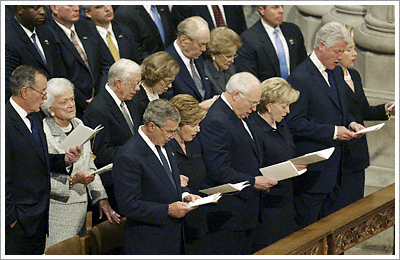
Other coverage:
LA Times – Nation Bids Farewell at Cathedral
USA Today – Reagan praised as ‘enduring symbol of our country’
AP – Nation bids final farewell to Reagan
UPDATE: More photos from the LA Times:
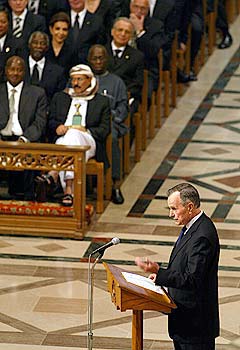
Former President George Bush gives a eulogy during the funeral service for former President Reagan at the Washington National Cathedral.
(Carolyn Cole / LAT)
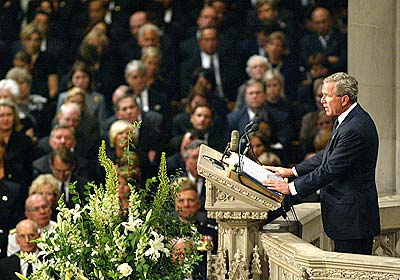
President George Bush speaks about former President Reagan during
the service held at the Washington National Cathedral. (Carolyn Cole / LAT)
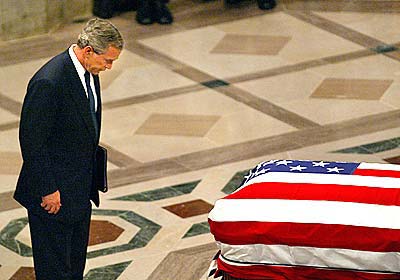
President George Bush bows his head in honor of former President Reagan at the funeral service held at the Washington National Cathedral. (Carolyn Cole / LAT)
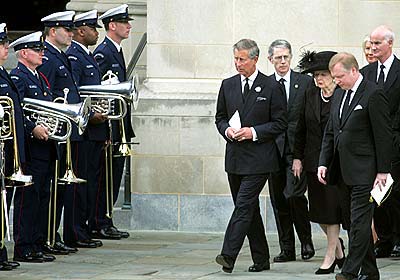
British Prince Charles and former Prime Minister Margaret Thatcher exit
the cathedral following funeral services at Washington National Cathedral in Washington D.C. (Damon Winter / LAT)
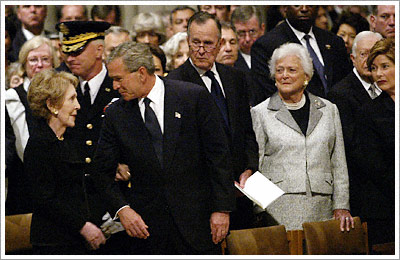
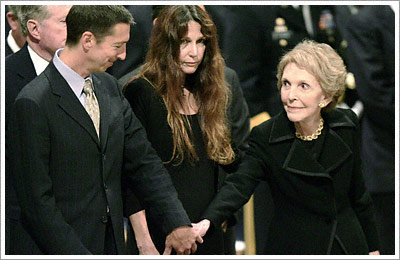
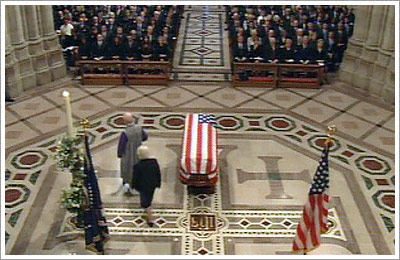
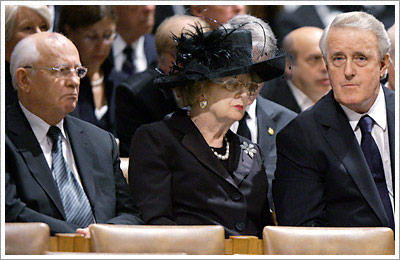
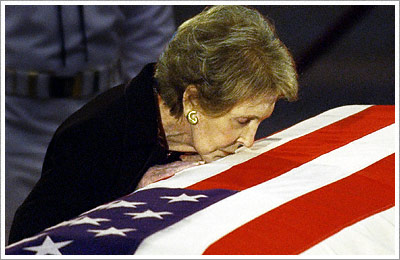
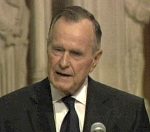
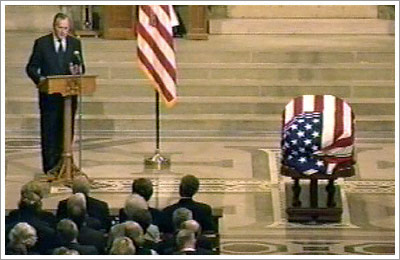
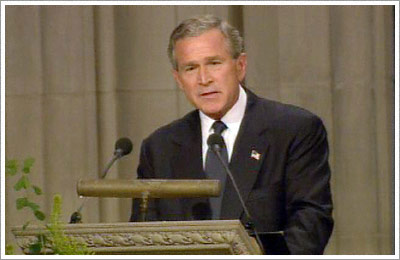
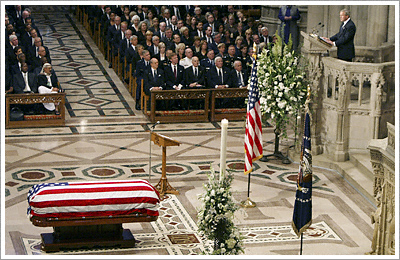


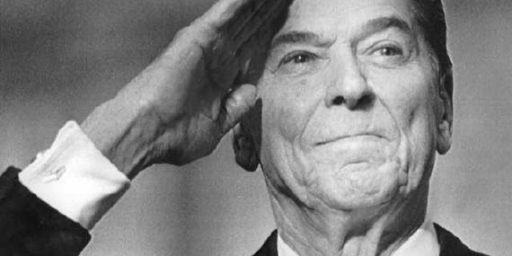
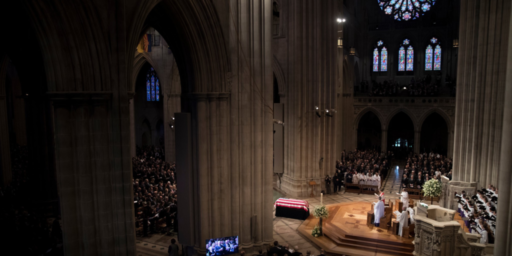

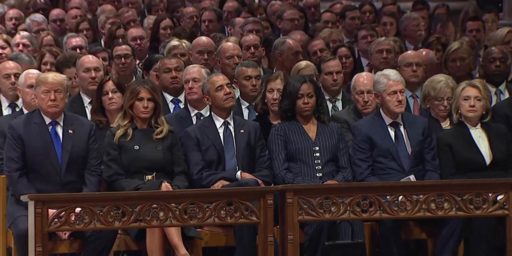
I thought Mulroney’s eulogy was brilliant. It really captured the spirit of Reagan. I had to suffer thru the MSNBC web feed though.
Thanks for the link.
What did you think of Hillary and Billary sleeping at the National Cathedral today. They are the epitomy of “Hicks from Arkansas”. I’m embarrassed that we had to call him “president”
“Right-wing Clinton-hating” Fox News Channel’s on-air people were actually sticking up for the Clintons, telling how uncomfortable the chairs are, etc., so it’s unlikely they were actually nodding off.
I dunno. Democrats still believe the Clintons are the most talented politicians in American history — maybe one of their talents is being able to sleep in uncomfortable chairs.
Does anyone out there know the name of the music selection that was played at President Reagan’s body was removed at the end of the service at the National Cathedral? I don’t know if it was a classical piece or a hymn…
Any information would be appreciated..thank you
The music selections played as President Reagan’s body was removed from the National Cathedral were: First was (with choir) “We Were Soldiers”. The second was “Jerusalem” and after that they once again played “We Were Soldiers” (instrumental only).
It was a privilege to see this historic event, and to hear the exceptional Patti Davis, Michael and Ron Reagan’s poised, personal and eloquent speeches.
“Ruth” – Could I trouble you for more details on details of the music you mentioned (“We Were Soldiers”, “Jerusalem”)? Composer’s name, please?
many thanks
si*******@ya***.com
Late comment: Maybe the only way the Clinton’s could possibly stay awake is if they were asked to speak. Let’s face it. The only people they like to hear speak is themselves. Of course, not to each other.
I am looking for the scriptural quotes used at President Reagans Funeral in all of the locations.
Evangelicals, particularly, enjoyed hearing such old favorites as “Softly and Tenderly” and “Just As I Am” for the Friday night tribute in California.
Evangelicals, particularly, enjoyed hearing such old favorites as “Softly and Tenderly” and “Just As I Am” for the Friday night tribute in California.
Well, I’ve done some searching regarding “Jerusalem” and “We Were Soldiers” but I could’t come up with an actual answer as to the composers, etc. They were so beautiful I’d love to know as well, but the only reason I know the names is that we noted them as we saw them displayed on one of the stations as they were playing. Meanwhile, I have another question: Did anyone else have a problem with Rev. Wenning’s comments at the gravesite? I thought everything else was perfect but this.
Have done some research on my original question regarding the music played at the end of the service at the National Cathedral.
…The music played at the recessional was titled “THE MANSIONS OF THE LORD written by Nick Glennie Smith….some people posting here are making the mistake of calling it “WE WERE BROTHERS”…The Mansions of the Lord piece was featured in the 2002 movie entitled “We Were Brothers” and was sung by the West Point Glee Club. At President Reagan’s service, it was sung at the end, but then only instrumental was played as the casket was being led out.
Another person posting incorrectly identified another hymn played as being titled JERUSALEM…the correct title is “O LOVE OF GOD, HOW STRONG & TRUE and the composer was Jerusalem, it was written by C. Hubert H. Parry 1916, and arranged my Michael McCarthy, 2004. Anyone interested should go to the Washington National Cathedral site for a complete listing of the music, which I was told to do by someone on this board…Hope I was helpful..
Here is a link to the Order of Music from the service.
http://www.cathedral.org/cathedral/pdfs/servicemusic040611.pdf
The music played as the casket was carried out has haunted me and I am glad to finally know what it is…thanks!!!!
So, did no one else have a problem with Rev. Wenning’s words at the burial site? For starters, I thought he made too many references to himself, but the imitation of Margaret Thatcher was a major gaffe. He should have reiterated what she said without imitating her. I saw a camera shot of the people around Margaret Thatcher while he was doing that, and, believe me, they were appalled and/or stifling a laugh as well.
Karen and Ruth, I was looking for some of the music played at the funeral as well. I am hoping to get a copy of the program that was given to the guests. It would be nice if that was made available to the public.
I am an organist and have always appreciated the music and solemnity in which things are done at National Cathedral. It is almost always executed very well. Erik Suter, the organist, is an aquaintance of mine. He is an incredibly talented young musician.
The piece you mentioned “Jerusalem” is actually the title of the “tune.” They sang the hymn “O love of God, How strong and true” to the tune of “Jerusalem. There are many hymns in churches that have different titles. However, each hymn has a name for its tune. They also sang “Sing with all the Saints in Glory.” Well, you probably recognized the “tune” which is named “Ode to Joy.” It is also found in most hymn books with the title “Joyful Joyful we adore thee.” If you look in the back of most major hymn books, you will find an index of all the “tunes” contained in the hymnal. You would probably find several of the tunes are associated with 2-3 different hymns.
Ruth, I watched practically all day… I found the Rev. Wenning’s remarks a bit strange… I couldn’t figure out what his purpose was… It seemed that he wanted to end the day repeating things we already heard as though they were all his personal thoughts and in doing so did seem to want to reference himself in the process…
I also could not help but notice Senator Danforth would begin speaking almost right away after a significant piece of music without waiting at least a few seconds for the reverberation to be heard and appreciated. It came across to me that he was ready to move on without any appreciation or respect for what was just sung. Perhaps I am wrong. That’s just how it came across.
Jim Sadie here again… Sorry, I forgot to leave my email. Would love to get feed back. Ji******@ao*.com
The character and behavior of the Clintons has nothing to do with the fact that they once occupied space in Arkansas. And now that they live in New York has nothing to do with the character and behavior of people from New York.
I also was mesmerized by the music and imagery during the recessional. The music alone was overwhelmingly but playing it while the honor guard solemnly moved forward was masterful. I think it was a most fitting tribute for any faithful American, especially Ronald Reagan.
I would like to find copies of the children’s speeches at the funeral. I have tried several places but don’t come up with the entire speech. I am particularly interested in Michael’s speech. I thought it was the highlight of the who ceremony.
To JIM SADIE,
Sent you a link via email regarding the Oratory and Music on compact disc from the state funeral…It is also right here:
http://cerebel.com/reagan/
Hi everyone,
I am trying to find the text of the Reagan children’s graveside eulogies. Do any of you know where I might be able to find those? I would be greatly appreciative. Please email me directly at as***********@ho*****.com.
Thanks in advance for your help,
Jennifer
Jennifer: Following is a transcript of the 3 grave-side eulogies by Mr. Reagan’s three surviving children. (Note: Maureen died in 2001 from cancer.)
Regards,
Marc Neville
MICHAEL REAGAN
Good evening. I’m Mike Reagan. You knew my father as governor, as president. But I knew him as dad. I want to tell you a little bit about my dad. A little bit about Cameron and Ashley’s grandfather because not a whole lot is ever spoken about that side of Ronald Reagan.
Ronald Reagan adopted me into his family 1945. I was a chosen one. I was the lucky one. And all of his years, he never mentioned that I was adopted either behind my back or in front of me. I was his son, Michael Edward Reagan.
When his families grew to be two families, he didn’t walk away from the one to go to the other. But he became a father to both. To Patti and then Ronnie, but always to Maureen, my sister, and myself.
We looked forward to those Saturday mornings when he would pick us up, sitting on the curve on Beverly Glen as his car would turn the corner from Sunset Boulevard and we would get in and ride to his ranch and play games and he would always make sure it ended up a tie.
We would swim and we would ride horses or we’d just watch him cut firewood. We would be in awe of our father. As years went by and I became older and found a woman I would marry, Colleen, he sent me a letter about marriage and how important it was to be faithful to the woman you love with a P.S.: You’ll never get in trouble if you say I love you at least once a day, and I’m sure he told Nancy every day “I love you” as I tell Colleen.
He also sent letters to his grandchildren. He wasn’t able to be the grandfather that many of you are able to be because of the job that he had. And so he would write letters. He sent one letter to Cameron, said: “Cameron, some guy got $10,000 for my signature. Maybe this letter will help you pay for your college education. He signed it, Grandpa. P.S. Your grandpa is the 40th president of the United States, Ronald Reagan. He just signed his sign.”
Those are the kinds of things my father did.
At the early onset of Alzheimer’s disease, my father and I would tell each other we loved each other and we would give each other a hug. As the years went by and he could no longer verbalize my name, he recognized me as the man who hugged him. So when I would walk into the house, he would be there in his chair opening up his arms for that hug, hello, and the hug goodbye. It was a blessing truly brought on by God.
We had wonderful blessings of that nature. Wonderful, wonderful blessings that my father gave to me each and every day of my life.
I was so proud to have the Reagan name and to be Ronald Reagan’s son. What a great honor. He gave me a lot of gifts as a child. Gave me a horse. Gave me a car. Gave me a lot of things. But there’s a gift he gave me that I think is wonderful for every father to give every son.
Last Saturday, when my father opened his eyes for the last time, and visualized Nancy and gave her such a wonderful, wonderful gift.
When he closed his eyes, that’s when I realized the gift that he gave to me, the gift that he was going to be with his Lord and Savior, Jesus Christ. He had, back in 1988 on a flight from Washington, D.C., to Point Mugu, told me about his love of God, his love of Christ as his Savior. I didn’t know then what it all meant. But I certainly, certainly know now.
I can’t think of a better gift for a father to give a son. And I hope to honor my father by giving my son Cameron and my daughter Ashley that very same gift he gave to me.
Knowing where he is this very moment, this very day, that he is in Heaven, and I can only promise my father this. Dad, when I go, I will go to Heaven, too. And you and I and my sister, Maureen, that went before us, we will dance with the heavenly host of angels before the presence of God. We will do it melanoma and Alzheimer’s free. Thank you for letting me share my father, Ronald Wilson Reagan.
PATTI DAVIS
Many years ago, my father decided to write down his reflections about death, specifically his own, and how he would want people to feel about it. He chose to write down the first verse of an Alfred Lord Tennyson poem, Crossing The Bar, and then he decided to add a couple lines of his own. I don’t think Tennyson will mind. In fact, they’ve probably already discussed it by now.
Tennyson wrote: “Sunset and evening star, And one clear call for me! And may there be no moaning of the bar, When I put out to sea.”
My father added: “We have God’s promise that I have gone on to a better world, where there is no pain or sorrow. Bring comfort to those who may mourn my going.”
My father never feared death, he never saw it as an ending. When I was a child, he took me out into a field at our ranch after one of the Malibu fires had swept through. I was very small and the field looked huge and lifeless, but he bent down and showed me how tiny new green shoots were peeking up out of the ashes just weeks after the fire had come through. “You see,” he said, “new life always comes out of death. It looks like nothing could ever grow in this field again, but things do.”
He was the one who generously offered funeral services for my goldfish on the morning of its demise. We went out into the garden and we dug a tiny grave with a teaspoon and he took two twigs and lashed them together with twine and formed a cross as a marker for the grave. And then he gave a beautiful eulogy.
He told me that my fish was swimming in the clear blue waters in heaven and he would never tire and he would never get hungry and he would never be in any danger and he could swim as far and wide as he wanted and he never had to stop, because the river went on forever. He was free.
When we went back inside and I looked at my remaining goldfish in their aquarium with their pink plastic castle and their colored rocks, I suggested that perhaps we should kill the others so they could also go to that clear blue river and be free.
He then took more time out of his morning — I’m sure he actually did have other things to do that day — and patiently explained to me that in God’s time, the other fish would go there, as well. In God’s time, we would all be taken home. And even though it sometimes seemed a mystery, we were just asked to trust that God’s time was right and wise.
I don’t know why Alzheimer’s was allowed to steal so much of my father — sorry — Before releasing him into the arms of death, but I know that at his last moment, when he opened his eyes, eyes that had not opened for many, many days and looked at my mother, he showed us that neither disease nor death can conquer love.
He may have in his lifetime come across a small book called Peace of Mind, by Joshua Loth Lieberman. If he did, I think he would have been struck by these lines: “Then for each one of us, the moment comes when the great nurse, death, takes man, the child, by the hand and quietly says, ‘It’s time to go home, night is coming. It is your bedtime, child of Earth.’ ”
RON REAGAN
He is home now. He is free. In his final letter to the American people, Dad wrote, “I now begin the journey that will lead me into the sunset of my life.” This evening, he has arrived.
History will record his worth as a leader. We here have long since measured his worth as a man. Honest, compassionate, graceful, brave. He was the most plainly decent man you could ever hope to meet.
He used to say, “A gentleman always does the kind thing.” And he was a gentleman in the truest sense of the word. A gentle man.
Big as he was, he never tried to make anyone feel small. Powerful as he became, he never took advantage of those who were weaker. Strength, he believed, was never more admirable than when it was applied with restraint. Shopkeeper, doorman, king or queen, it made no difference, Dad treated everyone with the same unfailing courtesy. Acknowledging the innate dignity in us all.
The idea that all people are created equal was more than mere words on a page, it was how he lived his life. And he lived a good, long life. The kind of life good men lead. But I guess I’m just telling you things you already know.
Here’s something you may not know, a little Ronald Reagan trivia for you, his entire life, Dad had an inordinate fondness for earlobes. Even as a boy, back in Dixon, Ill., hanging out on a street corner with his friends, they knew that if they were standing next to Dutch, sooner or later, he was going to reach over and grab hold of their lobe, give it a workout there. Sitting on his lap watching TV as a kid, same story. He would have hold of my ear lobe. I’m surprised I have any lobes left after all of that.
And you didn’t have to be a kid to enjoy that sort of treatment. Serving in the Screen Actors Guild with his great friend William Holden, the actor, best man at his wedding, Bill got used to it. They would be there at the meetings, and Dad would have hold of his earlobe. There they’d be, some tense labor negotiation, two big Hollywood movie stars, hand in earlobe.
He was, as you know, a famously optimistic man. Sometimes such optimism leads you to see the world as you wish it were as opposed to how it really is. At a certain point in his presidency, Dad decided he was going to revive the thumbs-up gesture. So he went all over the country, of course, giving everybody the thumbs up.
(UNINTELLIGIBLE) and I found ourselves in the presidential limousine one day returning from some big event. My mother was there and Dad was, of course, thumbs-upping the crowd along the way, and suddenly, looming in the window on his side of the car, was this snarling face. This fellow was reviving an entirely different hand gesture. And hoisted an entirely different digit in our direction. Dad saw this and without missing a beat turned to us and said, “You see? I think it’s catching on.”
Dad was also a deeply, unabashedly religious man. But he never made the fatal mistake of so many politicians wearing his faith on his sleeve to gain political advantage. True, after he was shot and nearly killed early in his presidency, he came to believe that God had spared him in order that he might do good. But he accepted that as a responsibility, not a mandate. And there is a profound difference.
Humble as he was, he never would have assumed a free pass to heaven. But in his heart of hearts, I suspect he felt he would be welcome there. And so he is home. He is free.
Those of us who knew him well will have no trouble imagining his paradise. Golden fields will spread beneath a blue dome of a western sky. Live oaks will shadow the rolling hillsides. And someplace, flowing from years long past, a river will wind toward the sea. Across those fields, he will ride a gray mare he calls Nancy D. They will sail over jumps he has built with his own hands. He will, at the river, carry him over the shining stones. He will rest in the shade of the trees.
Our cares are no longer his. We meet him now only in memory. But we will join him soon enough. All of us. When we are home. When we are free.
Thank you so much for the three eulogies of Ronald Reagan’s children.I couldn’t believe that they would be so hard to find.
Lois Wiese
The State Funeral for Ronald Reagan was very moving. How can I get a copy of the funeral program from the National Cathedral Service? I am a history teacher and would like to share this with my students in the fall.
The State Funeral for Ronald Reagan was very moving. How can I get a copy of the funeral program from the National Cathedral Service? I am a history teacher and would like to share this with my students in the fall.
TO BRENDA SCOTT,
Try the National Cathedral in Washington website which is as follows:
http:/www.cathedral.org/cathedral/
To Brenda Scott,
Actually the website for the national cathedral has the complete musical program associated with the state funeral, but I don’t know if they have copies online of the actual funeral program….
To Brenda Scott,
Actually the website for the national cathedral has the complete musical program associated with the state funeral, but I don’t know if they have copies online of the actual funeral program….
Just read all the postings. Glad others noted the Clintons’ behavior. My daughter-in-law summed it up so well when she said it’s a wonder Clinton didn’t burst into flames sitting in that cathedral with the other Presidents. Reagan made the Presidency something noble; Clinton tarnished it.
I agree with all who were moved by the music during the service at the National Cathedral. I have been humming The Mansions Of The Lord tune since last week. I have been in many churches during my life and had never heard this music to my knowledge.
The view of the Clintons sitting together while we heard so much about the bond held sacred by the Reagans was like Ying and Yang.
I found myself weeping profusely upon hearing that final recessional hymn played at the National Cathedral. It was the perfect selection for such a grand and historical occasion. I was wondering how I’d ever find out the name of that song? Thank you for the titles to the songs.
. I found the Official Funeral Program in PDF format at http://www.cbsnews.com/htdocs/pdf/reaganfuneral.pdf. Perhaps you could print it out if you can’t get a hold of an official copy. Thanks to you all for the musical information.
Is a transcript available for VP Cheney’s comments at the State Funeral?
Since he didn’t speak at the state funeral, I’m guessing not. He did speak a couple days earlier at the Rotunda, as the body was laid in state.
I believe it was the military band that played “Goin Home” does anyone have any information on that song?
I believe it was the military band that played “Goin Home” does anyone have any information on that song?
hi…i loved the music they played before the final anthem that was sung at Reagans funeral.
the misic as they lifted the casket and were about to march out.
it was just music…no singing..no choir..
i keep reading its from we are soldiers soundtrack..but its not on there…
it does have the hymn but not just the instrumental that preceded it..
anyone can help me find it?
greatly appreciated..
that music gave me goose bumps!
thanks
karla
Karla – I think there are two different cd’s from we were soldiers. there is the score cd and there is the soundtrack. the score cd does not have it, the soundtrack does.
thanks so much Shane..i will check it out!
If all else fails, you can download a free mp3 file of the President’s entire funeral at audible.com. I downloaded it and like to fast forward to the end just to hear that music! 🙂